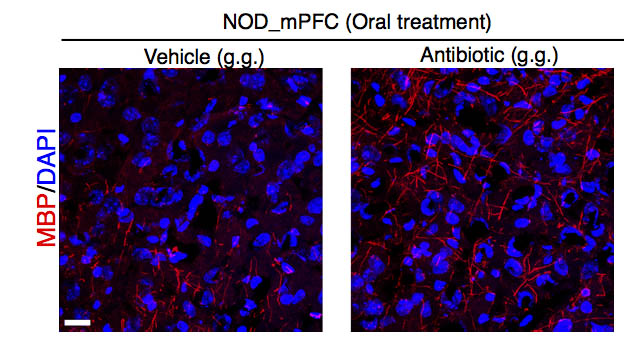Gut Feeling
Interview with
People often talk about having a "gut feeling" for things, and now, thanks to  Icahn School of Medicine scientist Mar Gacias, we have new insights into why. The bugs that live in the intestine communicate chemically - via the bloodstream - with the brain, where they can control gene expression and myelination, the process that leads to the ensheathment and support of nerve fibres and ultimately affects their function... Mar spoke to Chris Smith about this new insight...
Icahn School of Medicine scientist Mar Gacias, we have new insights into why. The bugs that live in the intestine communicate chemically - via the bloodstream - with the brain, where they can control gene expression and myelination, the process that leads to the ensheathment and support of nerve fibres and ultimately affects their function... Mar spoke to Chris Smith about this new insight...
Mar - We have discovered how alterations in the bacterial communities that we have in our intestine are able to modulate the amount of myelin that we have in our brain. And these changes in the myelin are able to induce behavioural consequences depending on the genetic background of the mice.
Chris - There's been a number of studies recently showing that the microbiome, the makeup of bacteria living in us and on us can have effects on an individual's mood and their predisposition to experiencing symptoms of things like stress and anxiety. So, does this fit with what you're finding here?
Mar - Yes, I think it fits 100 per cent and our paper gives an extra level of confidence providing a strong evidence of the microbiota moderates brain function, and the mood.
Chris - To be clear, are the animals that are developing or are these adults or both?
Mar - In our study, we're using adult animals and I think that's an important feature of the paper because most of the papers that are out right now have been using experimental paradigms during development. So in our paper, we have used two different groups of mice with different genetic backgrounds. We have depleted the microbiota of these mice using a cocktail of antibiotics. And also, we have used water as an internal control, not to affect the microbiota. What we have seen is that when we depleted the microbiota of these mice, we are not able to see any depressive-like phenotypes after mild stressors. However, when these mice have the intact microbiota because they have been treated with water, they do.
Chris - In summary then you've got these groups of mice and you either deplete the microorganisms that live in them and on them with antibiotics or you don't do that depletion. You stress the mice and they only show signs of being stressed or anxious if they've got intestinal bacteria there that haven't been depleted.
Mar - Yes.
Chris - And now, you've gone a step further and found perhaps what's going on in the brain to account for why they have that abnormal or different response. So how did you do that?
Mar - After seeing the behavioural phenotype, we wanted to see what's going on in the brain and what we did, we did an analysis of the transcriptional changes that are occurring in terms of gene expression in a brain area called prefrontal cortex. We saw that in the mice displaying depressive-like phenotype, there were some clusters of genes that are associated to myelin or sleep disorders that were affected.
Chris - But how do you link the bacteria being there or not to those changes in gene expression? What's the connection between those two?
Mar - It's a great question. This is one of the key experiments of the paper where we were able to directly link the bacterial communities with these changes in the brain doing a transplantation experiment. Meaning that we took the faecal content of the mice that have displayed a behavioural phenotype and we transfer this faecal content into mice that were healthy. So what we saw is just by transplanting the microbacteria from one mice to the other ones, we were also able to transfer not only the gene expression profile but also their behaviour, showing a causality in this case because just change in the microbiota of the recipients was sufficient to change as well their behaviour and their genetic expression profile in the brain.
Chris - So, you take mice that are not showing any of these stressed features. You have a group of mice that are, you do a transfer of the bugs from the symptomatic mice into the asymptomatic, the normal behaving mice and they not only show a change in behaviour. They also show this change in gene expression.
Mar - Exactly.
Chris - Now, how does the brain know that those bugs are in the gut? What's the signal?
Mar - In our paper, we have studied the metabolites that are produced in the gut at the level of the intestine. We have seen that the gut is able to produce some molecules that they can travel to the brain and affect the function of the brain. We have found one molecule that it's highly expressed or highly produced in the mice with the depressive phenotype. That is able to impact directly on the brain affecting the cells that produce myelin.
- Previous How post-mortems save lives
- Next Training the next generation










Comments
Add a comment